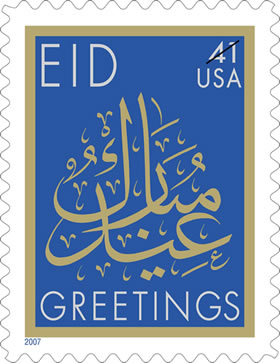
U.S. Commemorative Stamp
celebrating Eid, a Muslim festival
marking the end of Ramadan.
September 22, 2009
Eid is one of the most important Muslim festivals. It marks the end of the fasting of Ramadan. This year Muslims celebrated Eid A-Fitr on September 21st.
Coming with the new moon, the Eid festival marks the end of ‘Ramadan’ – a month when Muslims fast throughout the day and eat only at night. Prayers, feasts and family gatherings are the major highlights of the celebrations. It was during this month that the holy Koran was revealed. Eid means recurring happiness or festivity. Eid is celebrated with much enthusiasm and fervor and Muslims from all strata of life can be seen adorned in beautiful new clothes, visiting the mosques to attend Salatul Eid (Eid prayers). Greetings of “Eid-Mubarak” or “a blessed Eid” are exchanged.
A very important aspect of Eid is charity, which all Muslims are expected to extend to the needy. Earlier, this was in the form of gifts in kind but now cash is given to the needy. The first Eid of the year is known as “Eid Ul Fitr.” Ul Fitr literally means the breaking of fast. Thus Eid Ul Fitr is celebrated on the first day of Shawaal, the tenth month in the Muslim calendar, to mark the end of a month-long fast during the month of Ramadan.
As the third “pillar” or religious obligation of Islam, fasting has many special benefits. Among these, the most important is that it is a means of learning self-control. Due to the lack of preoccupation with the satisfaction of bodily appetites during the daylight hours of fasting, a measure of ascendancy is given to one’s spiritual nature, which becomes a means of coming closer to Allah. Ramadan is also a time of concentrated worship, reading of the Quran, purifying one’s behavior, giving charity and doing virtuous deeds.
The secondary objective of fasting is a way of experiencing hunger and developing compassion for the less fortunate, to learn to be thankful and appreciative for all of God’s bounties. Fasting is also advantageous to the health and provides a break in the cycle of rigid habits.
Eid Ul Fitr is a day of joy and thanksgiving. On this day, Muslims show their joy for the health, strength and opportunities of life, which Allah has given them to fulfill their obligations of fasting and other good deeds during the month of Ramadan. It is considered unholy to fast on this day. It is also a day of forgetting old grudges and ill feelings towards other fellow men. The second important Eid celebration is called “Eid Ul-Adha.”
Although only the pilgrims in Makkah can participate fully in the Hajj, all other Muslims in the world join with them by celebrating Eid Ul-Adha, or the “Celebration of Sacrifice.” On the 10th day of Dhul-Hijjah, the last month of the Islamic calendar, Muslims around the world celebrate this feast of commitment, obedience and self-sacrifice to Allah. They wear their nicest clothing and attend Salatul-Eid (Eid Prayer) in the morning. This is followed by a short sermon, after which everyone socializes. Next, people visit each other’s homes and partake in festive meals with special dishes, beverages and desserts. Children receive gifts and sweets on this happy occasion. In addition, like the pilgrims in Makkah, Muslims, who can afford to do so, offer domestic animals, usually sheep, as a symbol of Ibrahim’s (PBUH) sacrifice. The meat is distributed for consumption to family, friends, and to the poor and needy. Prayers are offered in mosques and Idgahs and elaborate festivities are held.


 The Hunger Site
The Hunger Site
September 22, 2009 at 11:08 am
Some Moslems have a different way of celebrating…
Per CNN today – Islamic Militants have destroyed more than 30 schools in the Swat Valley in the past month, according to the NWFP’s Ministry of Education.
The region is home to radical cleric Maulana Fazlullah, who has called girls’ schools un-Islamic and warned families to remove their daughters from such schools.
Welcome back to the 10th Century!